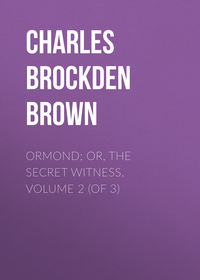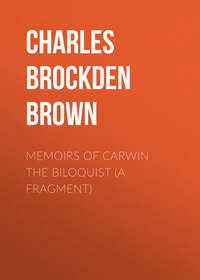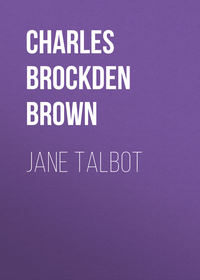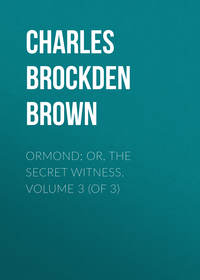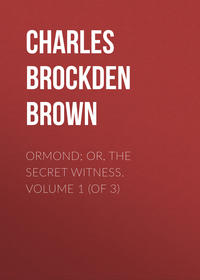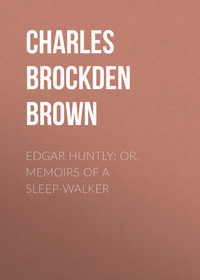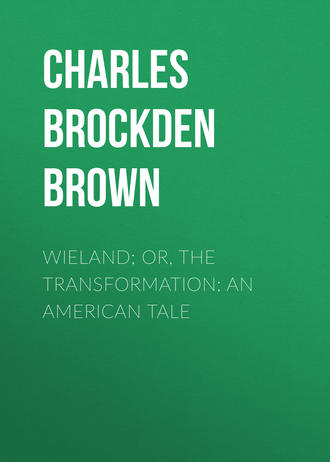 полная версия
полная версияWieland; Or, The Transformation: An American Tale
"They are well," he replied; "they are perfectly safe."
"Fear no effeminate weakness in me: I can bear to hear the truth. Tell me truly, are they well?"
He again assured me that they were well.
"What then," resumed I, "do you fear? Is it possible for any calamity to disqualify me for performing my duty to these helpless innocents? I am willing to divide the care of them with Mrs. Baynton; I shall be grateful for her sympathy and aid; but what should I be to desert them at an hour like this!"
I will cut short this distressful dialogue. I still persisted in my purpose, and he still persisted in his opposition. This excited my suspicions anew; but these were removed by solemn declarations of their safety. I could not explain this conduct in my friend; but at length consented to go to the city, provided I should see them for a few minutes at present, and should return on the morrow.
Even this arrangement was objected to. At length he told me they were removed to the city. Why were they removed, I asked, and whither? My importunities would not now be eluded. My suspicions were roused, and no evasion or artifice was sufficient to allay them. Many of the audience began to give vent to their emotions in tears. Mr. Hallet himself seemed as if the conflict were too hard to be longer sustained. Something whispered to my heart that havoc had been wider than I now witnessed. I suspected this concealment to arise from apprehensions of the effects which a knowledge of the truth would produce in me. I once more entreated him to inform me truly of their state. To enforce my entreaties, I put on an air of insensibility. "I can guess," said I, "what has happened—They are indeed beyond the reach of injury, for they are dead! Is it not so?" My voice faltered in spite of my courageous efforts.
"Yes," said he, "they are dead! Dead by the same fate, and by the same hand, with their mother!"
"Dead!" replied I; "what, all?"
"All!" replied he: "he spared NOT ONE!"
Allow me, my friends, to close my eyes upon the after-scene. Why should I protract a tale which I already begin to feel is too long? Over this scene at least let me pass lightly. Here, indeed, my narrative would be imperfect. All was tempestuous commotion in my heart and in my brain. I have no memory for ought but unconscious transitions and rueful sights. I was ingenious and indefatigable in the invention of torments. I would not dispense with any spectacle adapted to exasperate my grief. Each pale and mangled form I crushed to my bosom. Louisa, whom I loved with so ineffable a passion, was denied to me at first, but my obstinacy conquered their reluctance.
They led the way into a darkened hall. A lamp pendant from the ceiling was uncovered, and they pointed to a table. The assassin had defrauded me of my last and miserable consolation. I sought not in her visage, for the tinge of the morning, and the lustre of heaven. These had vanished with life; but I hoped for liberty to print a last kiss upon her lips. This was denied me; for such had been the merciless blow that destroyed her, that not a LINEAMENT REMAINED!
I was carried hence to the city. Mrs. Hallet was my companion and my nurse. Why should I dwell upon the rage of fever, and the effusions of delirium? Carwin was the phantom that pursued my dreams, the giant oppressor under whose arm I was for ever on the point of being crushed. Strenuous muscles were required to hinder my flight, and hearts of steel to withstand the eloquence of my fears. In vain I called upon them to look upward, to mark his sparkling rage and scowling contempt. All I sought was to fly from the stroke that was lifted. Then I heaped upon my guards the most vehement reproaches, or betook myself to wailings on the haplessness of my condition.
This malady, at length, declined, and my weeping friends began to look for my restoration. Slowly, and with intermitted beams, memory revisited me. The scenes that I had witnessed were revived, became the theme of deliberation and deduction, and called forth the effusions of more rational sorrow.
Chapter XVIII
I had imperfectly recovered my strength, when I was informed of the arrival of my mother's brother, Thomas Cambridge. Ten years since, he went to Europe, and was a surgeon in the British forces in Germany, during the whole of the late war. After its conclusion, some connection that he had formed with an Irish officer, made him retire into Ireland. Intercourse had been punctually maintained by letters with his sister's children, and hopes were given that he would shortly return to his native country, and pass his old age in our society. He was now in an evil hour arrived.
I desired an interview with him for numerous and urgent reasons. With the first returns of my understanding I had anxiously sought information of the fate of my brother. During the course of my disease I had never seen him; and vague and unsatisfactory answers were returned to all my inquires. I had vehemently interrogated Mrs. Hallet and her husband, and solicited an interview with this unfortunate man; but they mysteriously insinuated that his reason was still unsettled, and that his circumstances rendered an interview impossible. Their reserve on the particulars of this destruction, and the author of it, was equally invincible.
For some time, finding all my efforts fruitless, I had desisted from direct inquiries and solicitations, determined, as soon as my strength was sufficiently renewed, to pursue other means of dispelling my uncertainty. In this state of things my uncle's arrival and intention to visit me were announced. I almost shuddered to behold the face of this man. When I reflected on the disasters that had befallen us, I was half unwilling to witness that dejection and grief which would be disclosed in his countenance. But I believed that all transactions had been thoroughly disclosed to him, and confided in my importunity to extort from him the knowledge that I sought.
I had no doubt as to the person of our enemy; but the motives that urged him to perpetrate these horrors, the means that he used, and his present condition, were totally unknown. It was reasonable to expect some information on this head, from my uncle. I therefore waited his coming with impatience. At length, in the dusk of the evening, and in my solitary chamber, this meeting took place.
This man was our nearest relation, and had ever treated us with the affection of a parent. Our meeting, therefore, could not be without overflowing tenderness and gloomy joy. He rather encouraged than restrained the tears that I poured out in his arms, and took upon himself the task of comforter. Allusions to recent disasters could not be long omitted. One topic facilitated the admission of another. At length, I mentioned and deplored the ignorance in which I had been kept respecting my brother's destiny, and the circumstances of our misfortunes. I entreated him to tell me what was Wieland's condition, and what progress had been made in detecting or punishing the author of this unheard-of devastation.
"The author!" said he; "Do you know the author?"
"Alas!" I answered, "I am too well acquainted with him. The story of the grounds of my suspicions would be painful and too long. I am not apprized of the extent of your present knowledge. There are none but Wieland, Pleyel, and myself, who are able to relate certain facts."
"Spare yourself the pain," said he. "All that Wieland and Pleyel can communicate, I know already. If any thing of moment has fallen within your own exclusive knowledge, and the relation be not too arduous for your present strength, I confess I am desirous of hearing it. Perhaps you allude to one by the name of Carwin. I will anticipate your curiosity by saying, that since these disasters, no one has seen or heard of him. His agency is, therefore, a mystery still unsolved."
I readily complied with his request, and related as distinctly as I could, though in general terms, the events transacted in the summer-house and my chamber. He listened without apparent surprize to the tale of Pleyel's errors and suspicions, and with augmented seriousness, to my narrative of the warnings and inexplicable vision, and the letter found upon the table. I waited for his comments.
"You gather from this," said he, "that Carwin is the author of all this misery."
"Is it not," answered I, "an unavoidable inference? But what know you respecting it? Was it possible to execute this mischief without witness or coadjutor? I beseech you to relate to me, when and why Mr. Hallet was summoned to the scene, and by whom this disaster was first suspected or discovered. Surely, suspicion must have fallen upon some one, and pursuit was made."
My uncle rose from his seat, and traversed the floor with hasty steps. His eyes were fixed upon the ground, and he seemed buried in perplexity. At length he paused, and said with an emphatic tone, "It is true; the instrument is known. Carwin may have plotted, but the execution was another's. That other is found, and his deed is ascertained."
"Good heaven!" I exclaimed, "what say you? Was not Carwin the assassin? Could any hand but his have carried into act this dreadful purpose?"
"Have I not said," returned he, "that the performance was another's? Carwin, perhaps, or heaven, or insanity, prompted the murderer; but Carwin is unknown. The actual performer has, long since, been called to judgment and convicted, and is, at this moment, at the bottom of a dungeon loaded with chains."
I lifted my hands and eyes. "Who then is this assassin? By what means, and whither was he traced? What is the testimony of his guilt?"
"His own, corroborated with that of a servant-maid who spied the murder of the children from a closet where she was concealed. The magistrate returned from your dwelling to your brother's. He was employed in hearing and recording the testimony of the only witness, when the criminal himself, unexpected, unsolicited, unsought, entered the hall, acknowledged his guilt, and rendered himself up to justice.
"He has since been summoned to the bar. The audience was composed of thousands whom rumours of this wonderful event had attracted from the greatest distance. A long and impartial examination was made, and the prisoner was called upon for his defence. In compliance with this call he delivered an ample relation of his motives and actions." There he stopped.
I besought him to say who this criminal was, and what the instigations that compelled him. My uncle was silent. I urged this inquiry with new force. I reverted to my own knowledge, and sought in this some basis to conjecture. I ran over the scanty catalogue of the men whom I knew; I lighted on no one who was qualified for ministering to malice like this. Again I resorted to importunity. Had I ever seen the criminal? Was it sheer cruelty, or diabolical revenge that produced this overthrow?
He surveyed me, for a considerable time, and listened to my interrogations in silence. At length he spoke: "Clara, I have known thee by report, and in some degree by observation. Thou art a being of no vulgar sort. Thy friends have hitherto treated thee as a child. They meant well, but, perhaps, they were unacquainted with thy strength. I assure myself that nothing will surpass thy fortitude.
"Thou art anxious to know the destroyer of thy family, his actions, and his motives. Shall I call him to thy presence, and permit him to confess before thee? Shall I make him the narrator of his own tale?"
I started on my feet, and looked round me with fearful glances, as if the murderer was close at hand. "What do you mean?" said I; "put an end, I beseech you, to this suspence."
"Be not alarmed; you will never more behold the face of this criminal, unless he be gifted with supernatural strength, and sever like threads the constraint of links and bolts. I have said that the assassin was arraigned at the bar, and that the trial ended with a summons from the judge to confess or to vindicate his actions. A reply was immediately made with significance of gesture, and a tranquil majesty, which denoted less of humanity than godhead. Judges, advocates and auditors were panic-struck and breathless with attention. One of the hearers faithfully recorded the speech. There it is," continued he, putting a roll of papers in my hand, "you may read it at your leisure."
With these words my uncle left me alone. My curiosity refused me a moment's delay. I opened the papers, and read as follows.
Chapter XIX
"Theodore Wieland, the prisoner at the bar, was now called upon for his defence. He looked around him for some time in silence, and with a mild countenance. At length he spoke:
"It is strange; I am known to my judges and my auditors. Who is there present a stranger to the character of Wieland? who knows him not as an husband—as a father—as a friend? yet here am I arraigned as criminal. I am charged with diabolical malice; I am accused of the murder of my wife and my children!
"It is true, they were slain by me; they all perished by my hand. The task of vindication is ignoble. What is it that I am called to vindicate? and before whom?
"You know that they are dead, and that they were killed by me. What more would you have? Would you extort from me a statement of my motives? Have you failed to discover them already? You charge me with malice; but your eyes are not shut; your reason is still vigorous; your memory has not forsaken you. You know whom it is that you thus charge. The habits of his life are known to you; his treatment of his wife and his offspring is known to you; the soundness of his integrity, and the unchangeableness of his principles, are familiar to your apprehension; yet you persist in this charge! You lead me hither manacled as a felon; you deem me worthy of a vile and tormenting death!
"Who are they whom I have devoted to death? My wife—the little ones, that drew their being from me—that creature who, as she surpassed them in excellence, claimed a larger affection than those whom natural affinities bound to my heart. Think ye that malice could have urged me to this deed? Hide your audacious fronts from the scrutiny of heaven. Take refuge in some cavern unvisited by human eyes. Ye may deplore your wickedness or folly, but ye cannot expiate it.
"Think not that I speak for your sakes. Hug to your hearts this detestable infatuation. Deem me still a murderer, and drag me to untimely death. I make not an effort to dispel your illusion: I utter not a word to cure you of your sanguinary folly: but there are probably some in this assembly who have come from far: for their sakes, whose distance has disabled them from knowing me, I will tell what I have done, and why.
"It is needless to say that God is the object of my supreme passion. I have cherished, in his presence, a single and upright heart. I have thirsted for the knowledge of his will. I have burnt with ardour to approve my faith and my obedience.
"My days have been spent in searching for the revelation of that will; but my days have been mournful, because my search failed. I solicited direction: I turned on every side where glimmerings of light could be discovered. I have not been wholly uninformed; but my knowledge has always stopped short of certainty. Dissatisfaction has insinuated itself into all my thoughts. My purposes have been pure; my wishes indefatigable; but not till lately were these purposes thoroughly accomplished, and these wishes fully gratified.
"I thank thee, my father, for thy bounty; that thou didst not ask a less sacrifice than this; that thou placedst me in a condition to testify my submission to thy will! What have I withheld which it was thy pleasure to exact? Now may I, with dauntless and erect eye, claim my reward, since I have given thee the treasure of my soul.
"I was at my own house: it was late in the evening: my sister had gone to the city, but proposed to return. It was in expectation of her return that my wife and I delayed going to bed beyond the usual hour; the rest of the family, however, were retired.
"My mind was contemplative and calm; not wholly devoid of apprehension on account of my sister's safety. Recent events, not easily explained, had suggested the existence of some danger; but this danger was without a distinct form in our imagination, and scarcely ruffled our tranquillity.
"Time passed, and my sister did not arrive; her house is at some distance from mine, and though her arrangements had been made with a view to residing with us, it was possible that, through forgetfulness, or the occurrence of unforeseen emergencies, she had returned to her own dwelling.
"Hence it was conceived proper that I should ascertain the truth by going thither. I went. On my way my mind was full of these ideas which related to my intellectual condition. In the torrent of fervid conceptions, I lost sight of my purpose. Some times I stood still; some times I wandered from my path, and experienced some difficulty, on recovering from my fit of musing, to regain it.
"The series of my thoughts is easily traced. At first every vein beat with raptures known only to the man whose parental and conjugal love is without limits, and the cup of whose desires, immense as it is, overflows with gratification. I know not why emotions that were perpetual visitants should now have recurred with unusual energy. The transition was not new from sensations of joy to a consciousness of gratitude. The author of my being was likewise the dispenser of every gift with which that being was embellished. The service to which a benefactor like this was entitled, could not be circumscribed. My social sentiments were indebted to their alliance with devotion for all their value. All passions are base, all joys feeble, all energies malignant, which are not drawn from this source.
"For a time, my contemplations soared above earth and its inhabitants. I stretched forth my hands; I lifted my eyes, and exclaimed, O! that I might be admitted to thy presence; that mine were the supreme delight of knowing thy will, and of performing it! The blissful privilege of direct communication with thee, and of listening to the audible enunciation of thy pleasure!
"What task would I not undertake, what privation would I not cheerfully endure, to testify my love of thee? Alas! thou hidest thyself from my view: glimpses only of thy excellence and beauty are afforded me. Would that a momentary emanation from thy glory would visit me! that some unambiguous token of thy presence would salute my senses!
"In this mood, I entered the house of my sister. It was vacant. Scarcely had I regained recollection of the purpose that brought me hither. Thoughts of a different tendency had such absolute possession of my mind, that the relations of time and space were almost obliterated from my understanding. These wanderings, however, were restrained, and I ascended to her chamber.
"I had no light, and might have known by external observation, that the house was without any inhabitant. With this, however, I was not satisfied. I entered the room, and the object of my search not appearing, I prepared to return.
"The darkness required some caution in descending the stair. I stretched my hand to seize the balustrade by which I might regulate my steps. How shall I describe the lustre, which, at that moment, burst upon my vision!
"I was dazzled. My organs were bereaved of their activity. My eye-lids were half-closed, and my hands withdrawn from the balustrade. A nameless fear chilled my veins, and I stood motionless. This irradiation did not retire or lessen. It seemed as if some powerful effulgence covered me like a mantle.
"I opened my eyes and found all about me luminous and glowing. It was the element of heaven that flowed around. Nothing but a fiery stream was at first visible; but, anon, a shrill voice from behind called upon me to attend.
"I turned: It is forbidden to describe what I saw: Words, indeed, would be wanting to the task. The lineaments of that being, whose veil was now lifted, and whose visage beamed upon my sight, no hues of pencil or of language can pourtray.
"As it spoke, the accents thrilled to my heart. "Thy prayers are heard. In proof of thy faith, render me thy wife. This is the victim I chuse. Call her hither, and here let her fall."—The sound, and visage, and light vanished at once.
"What demand was this? The blood of Catharine was to be shed! My wife was to perish by my hand! I sought opportunity to attest my virtue. Little did I expect that a proof like this would have been demanded.
"My wife! I exclaimed: O God! substitute some other victim. Make me not the butcher of my wife. My own blood is cheap. This will I pour out before thee with a willing heart; but spare, I beseech thee, this precious life, or commission some other than her husband to perform the bloody deed.
"In vain. The conditions were prescribed; the decree had gone forth, and nothing remained but to execute it. I rushed out of the house and across the intermediate fields, and stopped not till I entered my own parlour. "My wife had remained here during my absence, in anxious expectation of my return with some tidings of her sister. I had none to communicate. For a time, I was breathless with my speed: This, and the tremors that shook my frame, and the wildness of my looks, alarmed her. She immediately suspected some disaster to have happened to her friend, and her own speech was as much overpowered by emotion as mine.
"She was silent, but her looks manifested her impatience to hear what I had to communicate. I spoke, but with so much precipitation as scarcely to be understood; catching her, at the same time, by the arm, and forcibly pulling her from her seat.
"Come along with me: fly: waste not a moment: time will be lost, and the deed will be omitted. Tarry not; question not; but fly with me!
"This deportment added afresh to her alarms. Her eyes pursued mine, and she said, "What is the matter? For God's sake what is the matter? Where would you have me go?"
"My eyes were fixed upon her countenance while she spoke. I thought upon her virtues; I viewed her as the mother of my babes: as my wife: I recalled the purpose for which I thus urged her attendance. My heart faltered, and I saw that I must rouse to this work all my faculties. The danger of the least delay was imminent.
"I looked away from her, and again exerting my force, drew her towards the door—'You must go with me—indeed you must.'
"In her fright she half-resisted my efforts, and again exclaimed, 'Good heaven! what is it you mean? Where go? What has happened? Have you found Clara?"
"Follow me, and you will see," I answered, still urging her reluctant steps forward.
"What phrenzy has seized you? Something must needs have happened. Is she sick? Have you found her?"
"Come and see. Follow me, and know for yourself."
"Still she expostulated and besought me to explain this mysterious behaviour. I could not trust myself to answer her; to look at her; but grasping her arm, I drew her after me. She hesitated, rather through confusion of mind than from unwillingness to accompany me. This confusion gradually abated, and she moved forward, but with irresolute footsteps, and continual exclamations of wonder and terror. Her interrogations Of "what was the matter?" and "whither was I going?" were ceaseless and vehement.
"It was the scope of my efforts not to think; to keep up a conflict and uproar in my mind in which all order and distinctness should be lost; to escape from the sensations produced by her voice. I was, therefore, silent. I strove to abridge this interval by my haste, and to waste all my attention in furious gesticulations.
"In this state of mind we reached my sister's door. She looked at the windows and saw that all was desolate—"Why come we here? There is no body here. I will not go in."
"Still I was dumb; but opening the door, I drew her into the entry. This was the allotted scene: here she was to fall. I let go her hand, and pressing my palms against my forehead, made one mighty effort to work up my soul to the deed.
"In vain; it would not be; my courage was appalled; my arms nerveless: I muttered prayers that my strength might be aided from above. They availed nothing.
"Horror diffused itself over me. This conviction of my cowardice, my rebellion, fastened upon me, and I stood rigid and cold as marble. From this state I was somewhat relieved by my wife's voice, who renewed her supplications to be told why we came hither, and what was the fate of my sister.


